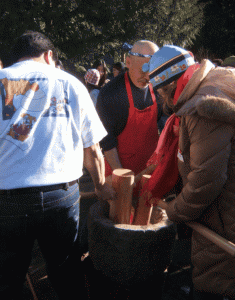 |
|
Making mochi naturally in Ecotopia. |
Noticing waste serves no purpose. Understanding it does. Whether we seek to manage waste or attempt to eliminate it entirely, we need to know how much of it exists and what form it takes—what is its volume, its shape, its weight. So we monitor it. We watch it. We learn from how it grows, how it spreads, and what its effects are.
On an idyllic spring day on Bainbridge Island near Seattle, Washington, in the crisp fresh air I stood rapt as people heated rice over an open fire. With huge mallets they furiously pounded the grains in a mortar, turning the hot steaming mass into a glutinous paste that is life’s most perfect confection—what the Japanese call mochi. With apparently heat-resistant hands, they grabbed and worked the steaming paste, transforming it into the fluffiest mochi balls imaginable.
…
Add new comment